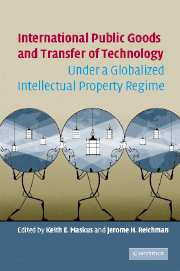Book contents
- Frontmatter
- Contents
- List of contributors
- Preface
- PART I International Provision of Public Goods under a Globalized Intellectual Property Regime
- PART II Innovation and Technology Transfer in a Protectionist Environment
- 8 Can the TRIPS Agreement Foster Technology Transfer to Developing Countries?
- Comment I: Technology Transfer on the International Agenda
- 9 Patent Rights and International Technology Transfer Through Direct Investment and Licensing
- Comment II: TRIPS and Technology Transfer – Evidence from Patent Data
- 10 Proprietary Rights and Collective Action: The Case of Biotechnology Research with Low Commercial Value
- 11 Do Stronger Patents Induce More Local Innovation?
- 12 Markets for Technology, Intellectual Property Rights, and Development
- 13 Using Liability Rules to Stimulate Local Innovation in Developing Countries: Application to Traditional Knowledge
- 14 Stimulating Agricultural Innovation
- PART III Sectoral Issues: Essential Medicines and Traditional Knowledge
- PART IV Reform and Regulation Issues
- Index
8 - Can the TRIPS Agreement Foster Technology Transfer to Developing Countries?
Published online by Cambridge University Press: 05 May 2010
- Frontmatter
- Contents
- List of contributors
- Preface
- PART I International Provision of Public Goods under a Globalized Intellectual Property Regime
- PART II Innovation and Technology Transfer in a Protectionist Environment
- 8 Can the TRIPS Agreement Foster Technology Transfer to Developing Countries?
- Comment I: Technology Transfer on the International Agenda
- 9 Patent Rights and International Technology Transfer Through Direct Investment and Licensing
- Comment II: TRIPS and Technology Transfer – Evidence from Patent Data
- 10 Proprietary Rights and Collective Action: The Case of Biotechnology Research with Low Commercial Value
- 11 Do Stronger Patents Induce More Local Innovation?
- 12 Markets for Technology, Intellectual Property Rights, and Development
- 13 Using Liability Rules to Stimulate Local Innovation in Developing Countries: Application to Traditional Knowledge
- 14 Stimulating Agricultural Innovation
- PART III Sectoral Issues: Essential Medicines and Traditional Knowledge
- PART IV Reform and Regulation Issues
- Index
Summary
Introduction
Since the 1970s, developing countries have expressed in various international fora their preoccupation about access to foreign technologies as a means of enhancing their technological capabilities and of narrowing the deep North-South gap in development levels. In response, developed countries argued during the Uruguay Round negotiations that strengthening and expanding the protection of intellectual property rights (IPRs) was a key condition to promote increased flows of technology transfer to developing countries. This argument has been repeatedly articulated by TRIPS enthusiasts and the industries that most benefit from the international rules set forth in the TRIPS Agreement.
Developing countries, however, have become increasingly skeptical about the existence of a virtuous relationship between IPRs and technology transfer. This skepticism underpins the request by these countries to establish a Working Group on Trade and Technology Transfer in the WTO, as agreed upon by the Doha Ministerial Conference, in November 2001.
A number of studies have been conducted to assess the impact of IPRs on technology transfer. However, the available evidence is limited and ambiguous, as is the case with regard to studies of the implications of IPR regimes on the flows of foreign direct investment. Some countries with “weak” IPR protection schemes, such as South Korea, Taiwan, Brazil, had been among the major technology borrowers in the pre-TRIPS era. The reverse situation can also be found.
- Type
- Chapter
- Information
- International Public Goods and Transfer of Technology Under a Globalized Intellectual Property Regime , pp. 227 - 256Publisher: Cambridge University PressPrint publication year: 2005
- 23
- Cited by



